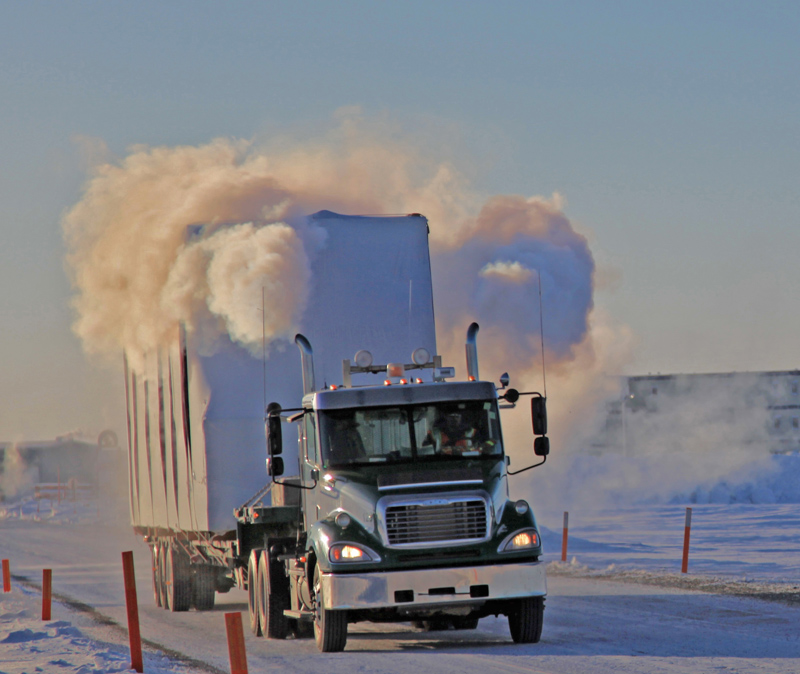 Broken thermometers, frozen brakes and landing gears, and frostbite. These are just a few of the challenges Alaska employees dealt with during the record-setting winter. The record high snowfalls and low temperatures made operations challenging for employees throughout the state. According to John Jansen, Terminal Manager at Lynden Transport in Prudhoe Bay, the challenges on the North Slope were not unique but more extreme than usual.
Broken thermometers, frozen brakes and landing gears, and frostbite. These are just a few of the challenges Alaska employees dealt with during the record-setting winter. The record high snowfalls and low temperatures made operations challenging for employees throughout the state. According to John Jansen, Terminal Manager at Lynden Transport in Prudhoe Bay, the challenges on the North Slope were not unique but more extreme than usual.
“Prudhoe Bay doesn’t get a lot of snow, maybe a foot or two a year, but the little bit we do get doesn’t melt for seven months,” he explains. “It just blows back and forth all winter causing extreme whiteout conditions, the strongest of which halts all outdoor operations on the oilfield.”
The winter was so brutal that even ice road construction was affected.
“At 30 below zero, the water they pour to create the ice roads freezes so fast it becomes difficult to form a smooth surface. It’s been too cold this winter to make good  ice,” says Bering Marine Captain Jack Rasmussen. “It’s also been tough on the hovercraft. We’ve had some 68-below days that became 80-below with the wind chill,” he explains. “Our heaters and thermometers stop working in the hangar.”
ice,” says Bering Marine Captain Jack Rasmussen. “It’s also been tough on the hovercraft. We’ve had some 68-below days that became 80-below with the wind chill,” he explains. “Our heaters and thermometers stop working in the hangar.”
The trucks were left running around the clock. “Besides the issues of freezing braking systems and valves, we have the additional challenge of hooking up to our trailers,” John explains. “We do this 20 to 30 times a day and it usually takes three to five minutes. At these temperatures, it can take 30 minutes. Instead of being slippery, the grease on the fifth wheels becomes stiff and tacky. It sometimes takes a blowtorch to warm up the landing gear cranks.”
And equipment isn’t the only thing that freezes. Employees on the North Slope sometimes needed to come inside to melt the frost off their clothes and faces. Dressing the part for these temperatures is serious business. Cell phones don’t always work in remote, frozen delivery areas, so John enforces a policy that employees check in every 30 minutes to let the team know they are o.k. “We are dealing with critical conditions up here and safety is our No. 1 priority for customers and employees,” he says.
 Lynden’s oilfield customers enforce safety shutdowns at 35-degrees below or colder for any hydraulic powered equipment used outdoors such as forklifts and loaders. When this occurs, the Prudhoe Bay team spends the downtime organizing and stripping loads to build one-stop and two-stop drops so they can quickly deliver freight to the waiting customers in the short window of warmer weather. “We had a situation this winter where we couldn’t deliver for six days. As soon as it warmed up we had all hands on deck to make as many deliveries to our customers as we could before the temperatures dropped again,” John says. “The whole crew will be glad when this winter is over.”
Lynden’s oilfield customers enforce safety shutdowns at 35-degrees below or colder for any hydraulic powered equipment used outdoors such as forklifts and loaders. When this occurs, the Prudhoe Bay team spends the downtime organizing and stripping loads to build one-stop and two-stop drops so they can quickly deliver freight to the waiting customers in the short window of warmer weather. “We had a situation this winter where we couldn’t deliver for six days. As soon as it warmed up we had all hands on deck to make as many deliveries to our customers as we could before the temperatures dropped again,” John says. “The whole crew will be glad when this winter is over.”
Topics from this blog: Lynden Transport Alaska Ground

